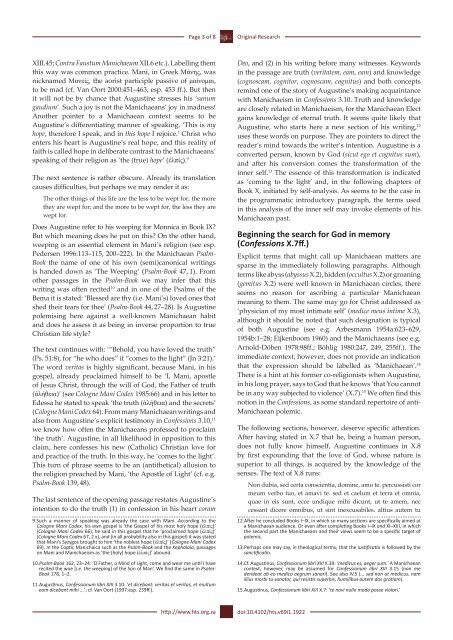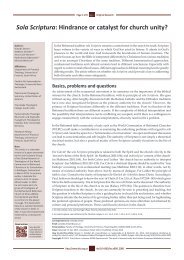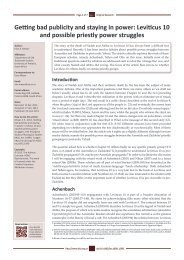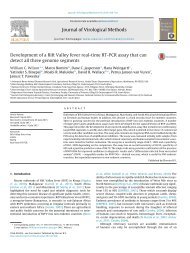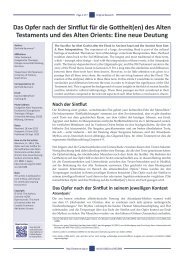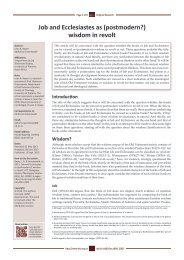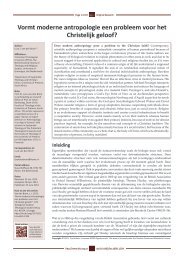A Manichaean analysis of Augustine's Confessions, Book X - HTS ...
A Manichaean analysis of Augustine's Confessions, Book X - HTS ...
A Manichaean analysis of Augustine's Confessions, Book X - HTS ...
You also want an ePaper? Increase the reach of your titles
YUMPU automatically turns print PDFs into web optimized ePapers that Google loves.
Page 3 <strong>of</strong> 8<br />
Original Research<br />
XIII.45; Contra Faustum Manichaeum XII.6 etc.). Labelling them<br />
this way was common practice. Mani, in Greek Μάνης, was<br />
nicknamed Μανείς, the aorist participle passive <strong>of</strong> μαίνομαι,<br />
to be mad (cf. Van Oort 2000:451–463, esp. 453 ff.). But then<br />
it will not be by chance that Augustine stresses his ‘sanum<br />
gaudium’. Such a joy is not the <strong>Manichaean</strong>s’ joy in madness!<br />
Another pointer to a <strong>Manichaean</strong> context seems to be<br />
Augustine’s differentiating manner <strong>of</strong> speaking. ‘This is my<br />
hope, therefore I speak, and in this hope I rejoice.’ Christ who<br />
enters his heart is Augustine’s real hope, and this reality <strong>of</strong><br />
faith is called hope in deliberate contrast to the <strong>Manichaean</strong>s’<br />
speaking <strong>of</strong> their religion as ‘the (true) hope’ (ἐλπίς). 9<br />
The next sentence is rather obscure. Already its translation<br />
causes difficulties, but perhaps we may render it as:<br />
The other things <strong>of</strong> this life are the less to be wept for, the more<br />
they are wept for; and the more to be wept for, the less they are<br />
wept for.<br />
Does Augustine refer to his weeping for Monnica in <strong>Book</strong> IX?<br />
But which meaning does he put on this? On the other hand,<br />
weeping is an essential element in Mani’s religion (see esp.<br />
Pedersen 1996:113–115, 200–222). In the <strong>Manichaean</strong> Psalm-<br />
<strong>Book</strong> the name <strong>of</strong> one <strong>of</strong> his own (semi)canonical writings<br />
is handed down as ‘The Weeping’ (Psalm-<strong>Book</strong> 47, 1). From<br />
other passages in the Psalm-<strong>Book</strong> we may infer that this<br />
writing was <strong>of</strong>ten recited 10 and in one <strong>of</strong> the Psalms <strong>of</strong> the<br />
Bema it is stated: ‘Blessed are thy (i.e. Mani’s) loved ones that<br />
shed their tears for thee’ (Psalm-<strong>Book</strong> 44, 27–28). Is Augustine<br />
polemising here against a well-known <strong>Manichaean</strong> habit<br />
and does he assess it as being in inverse proportion to true<br />
Christian life style?<br />
The text continues with: ‘“Behold, you have loved the truth”<br />
(Ps. 51:8), for “he who does” it “comes to the light” (Jn 3:21).’<br />
The word veritas is highly significant, because Mani, in his<br />
gospel, already proclaimed himself to be ‘I, Mani, apostle<br />
<strong>of</strong> Jesus Christ, through the will <strong>of</strong> God, the Father <strong>of</strong> truth<br />
(ἀλήθεια)’ (see Cologne Mani Codex 1985:66) and in his letter to<br />
Edessa he stated to speak ‘the truth (ἀλήθεια) and the secrets’<br />
(Cologne Mani Codex 64). From many <strong>Manichaean</strong> writings and<br />
also from Augustine’s explicit testimony in <strong>Confessions</strong> 3.10, 11<br />
we know how <strong>of</strong>ten the <strong>Manichaean</strong>s pr<strong>of</strong>essed to proclaim<br />
‘the truth’. Augustine, in all likelihood in opposition to this<br />
claim, here confesses his new (Catholic) Christian love for<br />
and practice <strong>of</strong> the truth. In this way, he ‘comes to the light’.<br />
This turn <strong>of</strong> phrase seems to be an (antithetical) allusion to<br />
the religion preached by Mani, ‘the Apostle <strong>of</strong> Light’ (cf. e.g.<br />
Psalm-<strong>Book</strong> 139, 48).<br />
The last sentence <strong>of</strong> the opening passage restates Augustine’s<br />
intention to do the truth (1) in confession in his heart coram<br />
9.Such a manner <strong>of</strong> speaking was already the case with Mani. According to the<br />
Cologne Mani Codex, his own gospel is ‘the Gospel <strong>of</strong> his most holy hope (ἐλπίς)’<br />
(Cologne Mani Codex 66), he said in this gospel that he ‘proclaimed hope (ἐλπίς)’<br />
(Cologne Mani Codex 67, 2 x), and (in all probability also in this gospel) it was stated<br />
that Mani’s Syzygos brought to him ‘the noblest hope (ἐλπίς)’ (Cologne Mani Codex<br />
69). In the Coptic Manichaica such as the Psalm-<strong>Book</strong> and the Kephalaia, passages<br />
on Mani and Manichaeism as ‘the (holy) hope (ἐλπίς)’ abound.<br />
10.Psalm-<strong>Book</strong> 162, 23–24: ‘O Father, o Mind <strong>of</strong> Light, come and wear me until I have<br />
recited the woe [i.e. the weeping] <strong>of</strong> the Son <strong>of</strong> Man’. We find the same in Psalm-<br />
<strong>Book</strong> 178, 1–2.<br />
11.Augustinus, Confessionum libri XIII 3.10: ‘et dicebant: veritas et veritas, et multum<br />
eam dicebant mihi ...’; cf. Van Oort (1997:esp. 239ff.).<br />
Deo, and (2) in his writing before many witnesses. Keywords<br />
in the passage are truth (veritatem, eam, eam) and knowledge<br />
(cognoscam, cognitor, cognoscam, cognitus) and both concepts<br />
remind one <strong>of</strong> the story <strong>of</strong> Augustine’s making acquaintance<br />
with Manichaeism in <strong>Confessions</strong> 3.10. Truth and knowledge<br />
are closely related in Manichaeism, for the <strong>Manichaean</strong> Elect<br />
gains knowledge <strong>of</strong> eternal truth. It seems quite likely that<br />
Augustine, who starts here a new section <strong>of</strong> his writing, 12<br />
uses these words on purpose. They are pointers to direct the<br />
reader’s mind towards the writer’s intention. Augustine is a<br />
converted person, known by God (sicut ego et cognitus sum),<br />
and after his conversion comes the transformation <strong>of</strong> the<br />
inner self. 13 The essence <strong>of</strong> this transformation is indicated<br />
as ‘coming to the light’ and, in the following chapters <strong>of</strong><br />
<strong>Book</strong> X, initiated by self-<strong>analysis</strong>. As seems to be the case in<br />
the programmatic introductory paragraph, the terms used<br />
in this <strong>analysis</strong> <strong>of</strong> the inner self may invoke elements <strong>of</strong> his<br />
<strong>Manichaean</strong> past.<br />
Beginning the search for God in memory<br />
(<strong>Confessions</strong> X.7ff.)<br />
Explicit terms that might call up <strong>Manichaean</strong> matters are<br />
sparse in the immediately following paragraphs. Although<br />
terms like abyss (abyssus X.2), hidden (occultus X.2) or groaning<br />
(gemitus X.2) were well known in <strong>Manichaean</strong> circles, there<br />
seems no reason for ascribing a particular <strong>Manichaean</strong><br />
meaning to them. The same may go for Christ addressed as<br />
‘physician <strong>of</strong> my most intimate self’ (medice meus intime X.3),<br />
although it should be noted that such designation is typical<br />
<strong>of</strong> both Augustine (see e.g. Arbesmann 1954a:623–629,<br />
1954b:1–28; Eijkenboom 1960) and the <strong>Manichaean</strong>s (see e.g.<br />
Arnold-Döben 1978:98ff.; Böhlig 1980:247, 249, 255ff.). The<br />
immediate context, however, does not provide an indication<br />
that the expression should be labelled as ‘<strong>Manichaean</strong>’. 14<br />
There is a hint at his former co-religionists when Augustine,<br />
in his long prayer, says to God that he knows ‘that You cannot<br />
be in any way subjected to violence’ (X.7). 15 We <strong>of</strong>ten find this<br />
notion in the <strong>Confessions</strong>, as some standard repertoire <strong>of</strong> anti-<br />
<strong>Manichaean</strong> polemic.<br />
The following sections, however, deserve specific attention.<br />
After having stated in X.7 that he, being a human person,<br />
does not fully know himself, Augustine continues in X.8<br />
by first expounding that the love <strong>of</strong> God, whose nature is<br />
superior to all things, is acquired by the knowledge <strong>of</strong> the<br />
senses. The text <strong>of</strong> X.8 runs:<br />
Non dubia, sed certa conscientia, domine, amo te. percussisti cor<br />
meum verbo tuo, et amavi te. sed et caelum et terra et omnia,<br />
quae in eis sunt, ecce undique mihi dicunt, ut te amem, nec<br />
cessant dicere omnibus, ut sint inexcusabiles. altius autem tu<br />
12.After he concluded <strong>Book</strong>s I–IX, in which so many sections are specifically aimed at<br />
a <strong>Manichaean</strong> audience. Or even after completing <strong>Book</strong>s I–IX and XI–XIII, in which<br />
the second part the <strong>Manichaean</strong>s and their views seem to be a specific target <strong>of</strong><br />
polemic.<br />
13.Perhaps one may say, in theological terms, that the iustificatio is followed by the<br />
sanctificatio.<br />
14.Cf. Augustinus, Confessionum libri XIII X.39: ‘medicus es, aeger sum.’ A <strong>Manichaean</strong><br />
context, however, may be assumed for Confessionum libri XIII II.15 (non me<br />
derideat ab eo medico aegrum sanari). See also IV.5 (... sed non ut medicus. nam<br />
illius morbi tu sanator, qui resistis superbis, humilibus autem das gratiam).<br />
15.Augustinus, Confessionum libri XIII X.7: ‘te novi nullo modo posse violari.’<br />
http://www.hts.org.za<br />
doi:10.4102/hts.v69i1.1922


